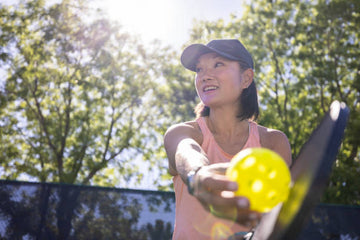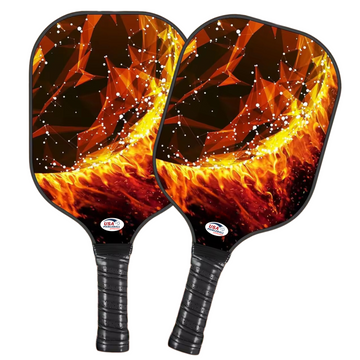Pickleball is more than a fun game–it engages both the body and mind in unique ways. Players always react to fast-paced movements and strategic shots. This stimulates brain activity and coordination.
Research shows that playing pickleball can improve memory, focus, and mood. By combining physical exercise with social interaction. This combination helps release feel-good chemicals that boost happiness.
Beyond the mental benefits. Pickleball’s moderate intensity and accessibility make it a sport people of all ages can enjoy. Its social aspect also reduces feelings of loneliness, contributing to better mental health.
How Pickleball Enhances Brain Health
The right pickleball paddle doesn’t just improve your game—it helps sharpen your mind, too.
Pickleball combines physical activity with quick thinking and strategic moves. This interplay challenges the brain, promoting sharper focus and improved memory. In addition, the creation of new neural pathways.
Cognitive Benefits of Fast-Paced Play
The fast pace of pickleball requires players to assess ball trajectories. anticipate opponents’ shots, and react in real-time. This constant processing keeps the brain focused, strengthening attention and decision-making skills.
Players must often switch between offense and defense rapidly, which exercises cognitive flexibility. This ability to adapt strategies on the fly helps maintain mental agility.
The game’s rhythm promotes speeded-up mental processing. Repeated exposure to these demands can enhance brain health. particularly in areas related to visual-motor coordination and reaction time.
Neuroplasticity and Learning New Skills
Playing pickleball means picking up new skills like how to grip the paddle. When to use different shots, and where to move on the court. As you learn and get better, your brain is actually rewiring itself. Thanks to neuroplasticity, its amazing ability to adapt and grow through new experiences
Repeated practice creates stronger neural networks, making movements more automatic and efficient. The more the brain engages in new motor patterns, the better it adapts to other learning tasks.
This adaptability supports lifelong brain health and may reduce cognitive decline. Pickleball involves complex motor skills that keep your brain constantly learning and adapting. These challenges help support brain growth and build mental resilience over time
Memory Retention Through Strategic Gameplay
Pickleball involves remembering opponents’ tendencies, shot patterns, and strategic court positioning. This memory use supports both short-term and working memory functions.
The right pickleball paddle can sharpen your game and boost memory retention
Players must plan and adjust their tactics based on evolving gameplay. This continuous strategic thinking reinforces executive functions in the brain.
During matches, your brain processes sights, sounds, and movement. This blend of sensory input and physical action helps strengthen memory. Also improve how deeply information is stored. Enhanced memory retention benefits daily activities beyond the court.
Mood-boosting Power of Pickleball
Pickleball isn’t just great exercise—it’s also a fun way to connect with others. The combination of movement and social interaction gives your mood a natural lift. While you're enjoying the game, your brain releases feel-good chemicals. The shared laughs and teamwork add an extra layer of happiness
Endorphins and Emotional Well-Being
Playing pickleball increases endorphin production, the brain’s natural “feel-good” chemicals. Endorphins reduce pain perception and create a sense of euphoria, often called a “runner’s high,” which can improve mood during and after play.
The right pickleball paddle boosts your game and lifts your mood with endorphins
Getting active with pickleball helps lower stress by bringing down cortisol—the hormone tied to anxiety. All that quick movement and energy also gets your heart pumping. This is great for your brain and helps you feel more balanced, focused, and emotionally strong
Playing pickleball on a regular basis gives your body a steady boost of endorphins. The feel-good chemicals that help melt away stress and lift your mood. Making you feel better both in the moment and over time
The Role of Social Interaction in Happiness
Since pickleball is often played in pairs or groups, it brings people together. The friendly rallies, high-fives, and shared laughs help build real connections. Those positive interactions spark the release of oxytocin. The 'bonding hormone' that boosts trust and makes us feel more valued and understood.
Participants feel a sense of belonging and shared achievement. Which combats loneliness and social isolation. The social side of pickleball helps lift your spirits—easing feelings of loneliness or sadness and giving your self-confidence a healthy boost
The friendly competition and teamwork in pickleball create an encouraging environment. Players develop friendships and support networks, enhancing long-term psychological well-being.
Physical Activity’s Impact on Mental Wellness
Physical activity influences mental wellness by easing tension and improving sleep quality. These effects help support cognitive function. Emotional balance in consistent and measurable ways.
Stress Reduction Through Movement
Engaging in pickleball increases heart rate and encourages the release of endorphins. Natural chemicals that reduce stress levels. Regular play can lower cortisol. The hormone is linked to chronic stress, helping players feel calmer after matches.
The right pickleball bag helps you stay organized, reducing stress on and off the court
Movement also shifts focus away from daily worries by providing a mental break. One of the best parts of pickleball is how social it is. It brings people together. Helps you share some laughs, and takes the edge off stress by making you feel less alone.
Better Sleep for Sharper Minds
Playing pickleball promotes quicker sleep onset and deeper stages of restful sleep. Physical exertion helps regulate the body’s internal clock. Encouraging a more consistent sleep schedule.
Improved sleep quality supports memory consolidation and attention during the day. People who get regular exercise from activities like pickleball get better quality sleep. They also feel more alert and energized during the day.


